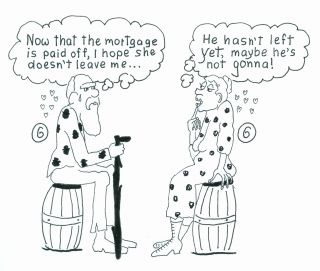
Pessimism
Pessimism and Enneagram Type 6 - The Questioner
Here is another connection between genes and personality type.
Posted August 6, 2013

Drawing by E. Wagele from “Are You My Type, Am I Yours?”
Two typical characteristics of the Questioner personality are pessimism and anxiety. Questioners are often loyal, witty, and particularly alert to danger.
Michael Mosley, likely a Questioner, wrote, “Can science explain why I’m a pessimist?” Realizing he was a pessimist and wanting to change, he visited psychologist and neuroscientist Elaine Fox. She measured the levels of electrical activity on the two sides of his brain with an electroencephalograph. He had more electrical activity in his right frontal cortex, which is associated with people who are prone to higher levels of pessimism and anxiety, than his left.
Dr. Fox gave him another test designed to measure his negative bias. He was wired and asked to press a button whenever he saw dots flashing in a particular pattern behind faces displayed on a computer screen. He was told not to focus on the faces, just on the dots. The reason his response time to the dots was faster when they appeared near the angry faces was that his attention had already been drawn there, though he was not aware of it. That meant he had a fundamentally negative bias. Fox suggested he try a short course of cognitive bias modification and mindfulness meditation. After seven weeks of this, Mosley felt much calmer. Michael Mosley, whose article this blog is based on, is a medical journalist and trained doctor. He wrote about pessimism and twins in BB News Magazine, 7-9-13.
Throughout our lives, in response to environmental factors, our genes are constantly being dialed up and down as with a dimmer switch. This is called epigenetics. Tim Spector of London studied a group of identical twins to find out why some people are more positive about life than others. He identified some genes that are switched on in one twin and not the other. He found about half the personality differences between us are due to genetic factors. (Each of the nine Enneagram types are probably linked to certain groups of genes.)
In one study, which started in 1975, scientists asked more than a thousand inhabitants of the town of Oxford, Ohio, to fill in a questionnaire about jobs, health, family, and attitudes towards growing older. Becca Levy of Yale University went through the death records much later and found those who had felt the most optimistic about growing older had lived, on average, around seven and a half years longer than those who were more pessimistic. This finding took into account other possible explanations, such as the fact that people who were more pessimistic may have been influenced by prior sickness or depression.
Deborah Danner and others at the University of Kentucky scored the diaries of 180 Catholic nuns, written when they entered their nunneries in the 1930s, for optimistic or pessimistic outlook. When they traced the history of the nuns, they discovered those who expressed the most positive emotions about life when they were in their early 20s lived up to 10 years longer than those who expressed the least.
These quotes, which also apply to the 6-Questioner, are from Michael Mosley’s article:
• "A pessimist sees difficulty in every opportunity. An optimist sees the opportunity in every difficulty" - Winston Churchill
• "I like pessimists. They're always the ones who bring lifejackets for the boat" - Lisa Kleypas
Visit http://wagele.com to check out my books, CD, cartoons, and essays, and Famous Enneagram Types.
Read my WordPress blog of 7-30-13: “Education and Good Health Help Prevent Dementia.”

